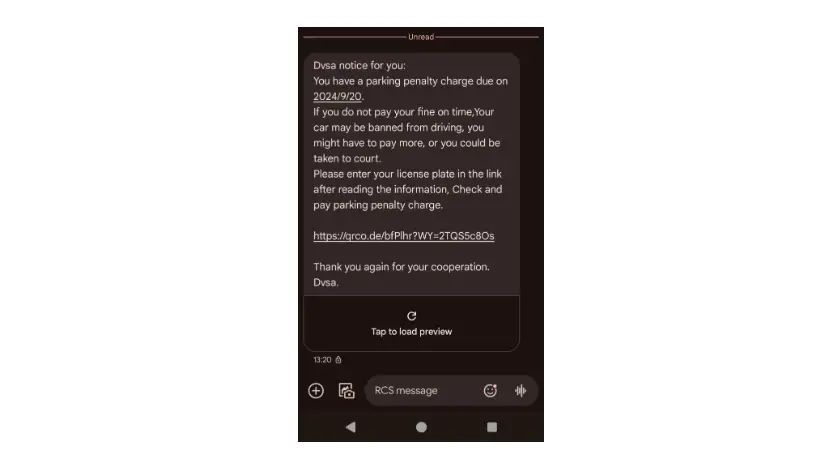The Driver and Vehicle Standards Agency (DVSA) has alerted the public to a new scam involving fake text messages about parking fines.
As scams become more sophisticated, it’s crucial to recognize how this one works and know what steps to take if targeted.

About DVSA Parking Fine Text
The DVSA has warned of a scam where fraudsters send fake text messages claiming unpaid parking fines, threatening severe consequences like driving bans or legal action.
The DVSA clarified they do not handle parking fines, and these urgent messages are designed to pressure drivers into quick, uninformed responses.
How Does DVSA Parking Fine Text Scam Work?
Scammers send text messages that appear to be from the DVSA, using official-sounding language to claim the recipient has an unpaid parking fine. These messages create urgency by threatening consequences like banning the recipient’s car if they don’t pay quickly.
The message includes a link to a fake website designed to look like an official government page, where victims are asked to provide personal information, such as vehicle registration and payment details. Scammers then use this data for identity theft or financial fraud, preying on the sense of urgency to trick victims into sharing sensitive information.
The Text Looks Like –
DVSA notice for you: You have a parking penalty charge due on 2024/9/30. If you do not pay your fine on time, your car may be banned from driving, you might have to pay more, or you could be taken to court. Please enter your license plate in the link after reading the information. Check and pay parking penalty charge. Thank you again for your cooperation. DVSA.
What You Should Consider Doing If Scammed
If you’ve been targeted by this scam, take these steps immediately:
- Forward the suspicious message to the National Cyber Security Centre (NCSC) through their official channels to help authorities track it.
- If you’ve shared financial information, notify your bank right away to secure your accounts.
- Regularly check your bank statements and online accounts for any unusual activity.
- If you’ve lost money or suspect identity theft, report it to Action Fraud at www.actionfraud.police.uk or call them.
READ MORE —–